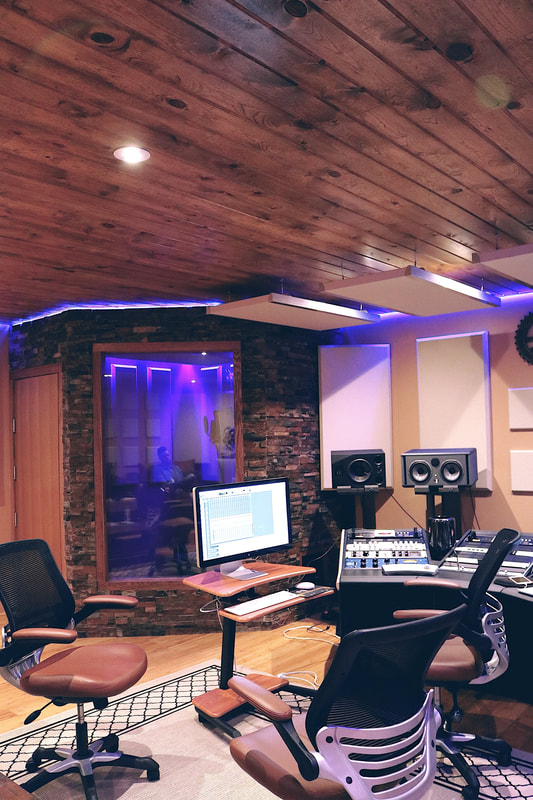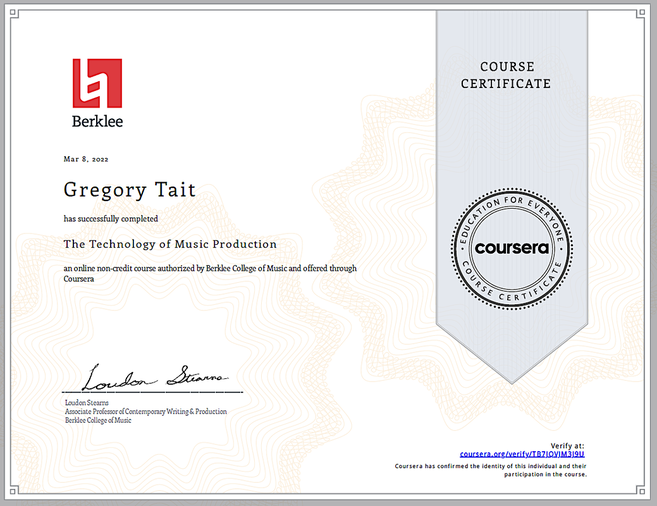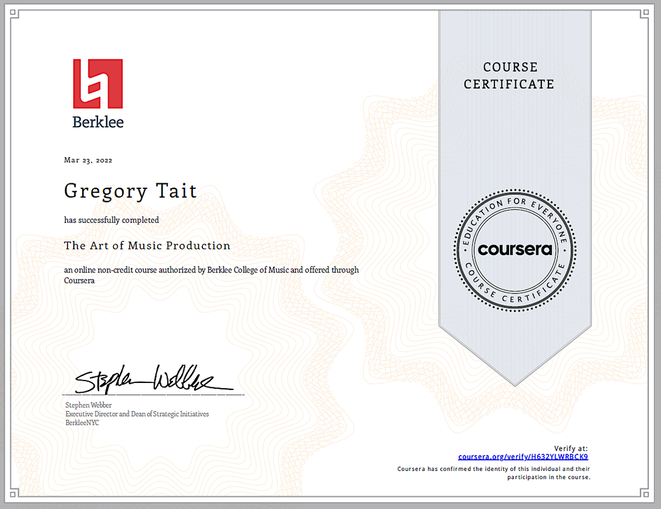|
Music Studio |
|
Choosing to take academic courses, perhaps even leading to a degree, in sound engineering and music production requires quite a bit of thought and planning. You need to ask the following questions: Why should you attend a music production school or program ? What knowledge and skills are you looking to obtain ? What are your career options after earning your degree or certificate ? Who are the top schools for music production ? Music production programs are becoming very popular at colleges and universities across the nation. You can major in music production ! Programs have different names, such as Recording Arts, Music Technology, Audio Engineering, Sound Production and Recording, and Music Production. Some schools exclusively offer music production degrees, such as Berklee College of Music and Full Sail University. There are schools that focus on music technology, leading to a bachelor of science (B.S.) degree, while others are more music or music-business focused, leading to a bachelor of arts (B.A.) degree, a bachelor of fine arts (B.F.A.) degree, or a bachelor of music (B.M.) degree. There are masters-level graduate programs too. Listed here are some of the big names in music production programs: Berklee College of Music (B.M. Music Production and Engineering) Full Sail University (B.S. Recording Arts, Audio Production; certificate programs) Musicians Institute (B.M. Composition (film score), A.A.S. Studio Recording) NYU Steinhardt (B.M. Music Technology) USC Thornton School of Music (B.M. Music Production) Drexel University Westphal College of Media Arts & Design (B.S. Music Industry) The knowledge and skills obtained from the technology portions of these programs include:
I received a B.A. degree in Music and Physics, and a Ph.D. degree in electrical engineering. My professional career was not involved with the music business. My only experience in sound engineering and music production was gained through years of “doing sound” at church and through the process of creating a home music recording studio. I thought it would be instructive and fun to take a couple of online courses in music production to see how my development stacks up against the knowledge and skills taught in these courses. I chose to take two certificate courses taught by Berklee School of Music faculty and offered through Coursera online. The first course I took was The Technology of Music Production , taught by Loudon Stearns, assistant professor of contemporary writing & production at Berklee School of Music. Here is the description of this course as printed in the catalog : “Learn about the music production process—including recording, editing, and mixing—and the tools available to you to create contemporary music on your computer. With the recent introduction of high-quality-low-cost software and hardware, the tools of music production are now available to the masses. Albums are made in bedrooms as well as studios. On the surface this is liberating. Anyone can make an album for the low cost of a couple pieces of gear and a software package. But, if you dig deeper, you will find that it is not so easy. Producing music requires knowledge, dedication, and creativity. Knowledge is where this course comes in. No matter what kind of music you are making, there is a large set of tools that you will need to use. Each lesson of this course will demonstrate a different set of music production tools, loosely following along the music production process of recording, editing, and mixing. We will start with some background on the nature of sound and how we perceive it. We will then examine the components necessary to record audio into a computer, so that you understand the devices that sound must travel through in a music production process. Once recorded, sound must be organized along a timeline, a process known as editing. It allows us to give the impression of perfect performances and create many of the sounds we hear in contemporary music. The contemporary editing tool is the Digital Audio Workstation (DAW), a piece of software that stores and organizes all the assets of a musical project. We will focus on the editing tools that are essential in contemporary music production and that all DAWs provide. After editing, sounds must be combined or mixed together, so we look to the mixing board—a very creative place if you know how to use it. We will explore the basic functionality of both hardware and software mixing boards, including volume, pan, mute, solo, buses, inserts, sends, and sub-mixes. The mixing process, however, includes more tools than the mixing board provides on its own. Sound must also be processed, modified from its recorded state to fit the context of the music. We will look at compression, equalization, and reverb, and examine the many audio effects that are offshoots of these devices and how they are used in a musical context. In the end, the music production process relies on your creativity. Creativity is a product of the mind and will stay there, unexpressed, until the right tools are used in the right way to share it with the world. If you have an idea in your head, it will take numerous steps, each with an important tool, to reach your audience. You bring the dedication and creativity, and this course will bring you the knowledge to make that happen.” The course consists of course videos and readings, graded assignments with peer feedback, graded quizzes with feedback, and graded programming assignments. The course is essentially self-paced, but due to the peer feedback, you need to move at about the same pace as your cohort. This course took me about 3-4 weeks to complete. Upon successful completion of the course, I received a Course Certificate: The second course I took was The Art of Music Production, taught by Stephen Webber, executive director at Berklee School of Music. Here is a description of this course as printed in the catalog : “Explore the art of record production and how to make recordings that other people will love listening to. This course will teach you how to make emotionally moving recordings on almost any recording equipment, including your phone or laptop. The emphasis is on mastering tangible artistic concepts; the gear you use is up to you. You will learn to develop the most important tool in the recording studio: your ears. You will learn to enhance every aspect of your own productions, both sonically and musically, by employing deeper listening skills. Assignments will include posting your own recordings for peer review, and reviewing your classmates’ work by employing specific tools and strategies. If you use a Digital Audio Workstation (DAW) to record and mix, that’s great, but as long as you can record into your computer and post an MP3, you can complete the assignments. As you learn about the art of record production in this 4-week course, you will also learn about yourself and who you are as an artist and producer.” Again, this course consists of course videos and readings, graded assignments with peer feedback, graded quizzes with feedback, and graded programming assignments. The course is essentially self-paced, but due to the peer feedback, you need to move at about the same pace as your cohort. This course took me about 3-4 weeks to complete. Upon successful completion of the course, I received a Course Certificate: There are two more courses offered by Berklee that, together with the two discussed above, constitute a program in Music Production Specialization . These two additional courses are Pro Tools Basics and Music Production Capstone . Given that the first two courses, the Technology of Music Production and the Art of Music Production, were very informative and fun, I would have liked to take these last two courses. But I am "married" to the PreSonus Studio One digital audio workstation (DAW), rather than the Pro Tools DAW, and I didn’t want to take the time to climb the steep learning curve of the Pro Tools software. Too bad -- I’m sure I would have loved the capstone project. Anyway, I would highly recommend these online short courses from Berklee School of Music. And definitely worth noting - Berklee offers semester-length online courses in Music Production that come very highly recommended. They are well worth the time, effort, and dollars. If you are serious about a career in music production, these educational resources are a great place to start. |
Categories
All
Archives
May 2023
|



 RSS Feed
RSS Feed
